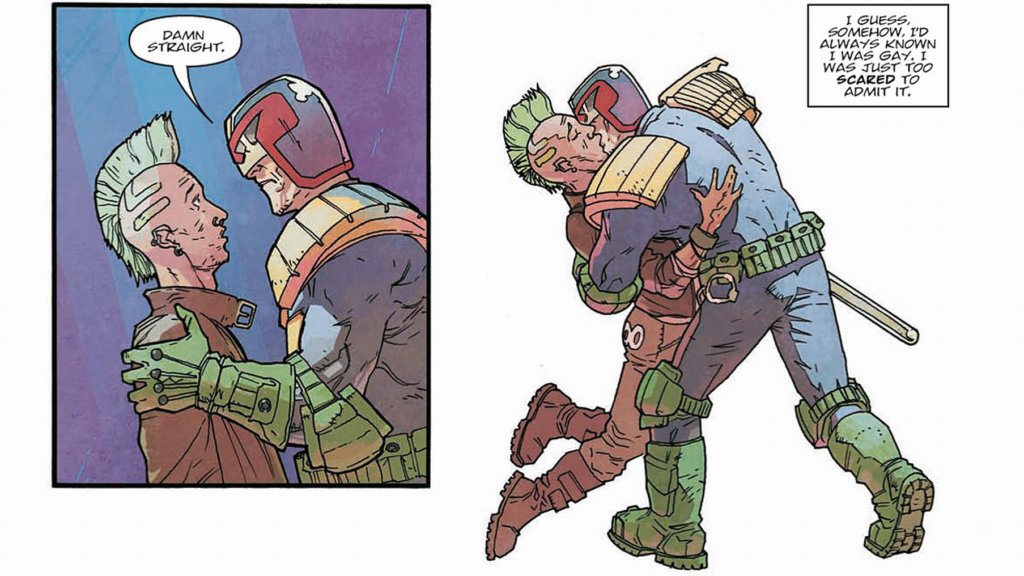
Comics Corner – That time Judge Dredd was gay (kinda)
Judge Dredd is an icon of British comics, a stalwart fixture of legendary sci-fi anthology 2000AD since its second issue, back in 1977. An authoritarian lawman in a ruined future where what remains of humanity is crammed into dangerously overpopulated Mega-Cities, Dredd is judge, jury, and often executioner. Put simply – as he so often does – he IS the law.
Back in 2013, it also looked like the law might be gay.
On the run up to the release of Prog 1817 of 2000AD – for the uninitiated, “Prog” is what the publication calls “issues”, one of many bits of unique lingo that are associated with the comic – British mainstream media was swept up with reports that Dredd would be revealed as gay in a one-shot story fittingly-titled ‘Closet’, written by Rob Williams and with art by Mike Dowling.
Many outlets ran with the same image at the top of this article, released by 2000AD publisher Rebellion to build hype for the story – Dredd grabbing a man and kissing him, while his inner monologue reflects on how he’d always known he was gay, but been “too scared to admit it”.
And why not? At a cursory glance, Dredd fits many of the traits of a closeted gay man – emotionally stunted, throws themselves into their work, never discusses their private life, has a penchant for leather and uniforms. OK, that last one is perhaps a matter of personal preference, but there’s a reason the Village People had a leather-clad cop. Visually, much of Judge Dredd as a character is already gay-coded.
The response was, somewhat sadly, predictable. Right-wing voices online were aghast that this paragon of manliness might be revealed as one of those dastardly homosexuals, and raged at how the story was just to appease leftie liberals. On the other side of the argument were those either welcoming the reveal, or debating where on the sexuality spectrum Dredd might fall. It was a low-key culture war, before they overtook practically every interaction on the internet.
At the time, writer Williams even told The Guardian that Dredd “may well be gay, straight or bi” but that any attraction was subsumed by his devotion to the law. However, Williams added ” can you imagine what would happen if that repression ever fell away, just for an instant? Sure, Dredd could be gay.”
Ultimately though, Dredd’s sexuality remained as undisclosed as his infamously never-seen face (the Sylvester Stallone movie does not count). In reality, ‘Closet’ followed a young man named Taylor Cook, and the now-infamous kiss took place at a nightclub euphemistically called “Dredd’s Daystick”, where gay men dressed as the Judges of Mega-City One, described as “a secret underground club inspired by the most macho man dressed in leather and a helmet this city had ever seen”.
The story itself is actually oddly sweet in places, or perhaps bittersweet, with Taylor recounting his difficulty with coming to terms with his own sexuality, and facing up to his abusive, homophobic father. In only six pages, ‘Closet’ also manages to convey the sense of acceptance many LGBTQ+ people experience when they do begin to find their community, and the freedom Taylor finds when he discovers Dredd’s Daystick reflects the importance of queer spaces in the real world.
The club itself is also unashamedly kinky. From the core theme of its patrons role-playing as Judges – a nod to real world uniform and leather bars emerging as places where gay men could explore a form of masculinity that society denied them – to a panel of two men walking into a dark room called the “Hall of Just Us” (a play on the Grand Hall of Justice where the Judges rule from), it doesn’t shy away from the sexual nature of such venues. Dowling conveys this reality without showing anything explicit, though.
However, everything takes a turn for the worse when the real Dredd and a cohort of his fellow Judges raid the club, ultimately sentencing everyone there – including Taylor – to five years in an isocube for impersonating a judge. While there’s a hint of positivity to the conclusion, with Taylor refusing to run from his arrest or his gayness, instead silently vowing to be “out” in more ways than one once he’s served his time, the story also raises questions about the kind of representation we want to see in mainstream media.
Although Judge Dredd is undoubtedly one of the most recognisable characters in comics, he’s unfortunately also… well, “politically complicated”, to say the least. Although the stories that feature him are often biting satire or dark predictions of our own direction of travel, Dredd himself is frequently portrayed as somewhere between an uncompromising authoritarian and an outright fascist. Past stories have seen him shooting pro-democracy protestors to maintain the Judges’ control, and even after a crisis of faith in the brutal system he upholds, only offered the citizens of Mega-City One a yes-no referendum on whether to continue the Judges’ rule or switch to democracy with no actual plan to deliver it. That particular story, ‘Twilight’s Last Gleaming‘ was published in 1991 – long pre-dating the UK’s Brexit vote on a similar binary choice with no clear planning – while Dredd’s overall use of violence and extreme force to maintain political order predicted both the militarisation of police forces and the civilian pushback, as in recent calls to “Defund the Police”.
Even as the real Dredd arrests Taylor in ‘Closet’, there’s an uncomfortable pause in his speech as he renders his verdict on the crime of “using the uniform for… entertainment purposes”. That ellipsis does a lot of heavy lifting, a momentary freeze as the jack-booted lawman dodges directly addressing the very obviously homosexual party his forces had interrupted, painting the idea as anathema to his sensibilities.
So yes, had Judge Dredd himself been revealed as gay, it would certainly have been a major moment for gay representation in comics and wider media – the question is, would we have wanted him as one of “ours”?
Although 2000AD Prog 1817 as a physical issue is the domain of the back issue market now, you can buy the issue digitally, direct from publisher Rebellion, here.





